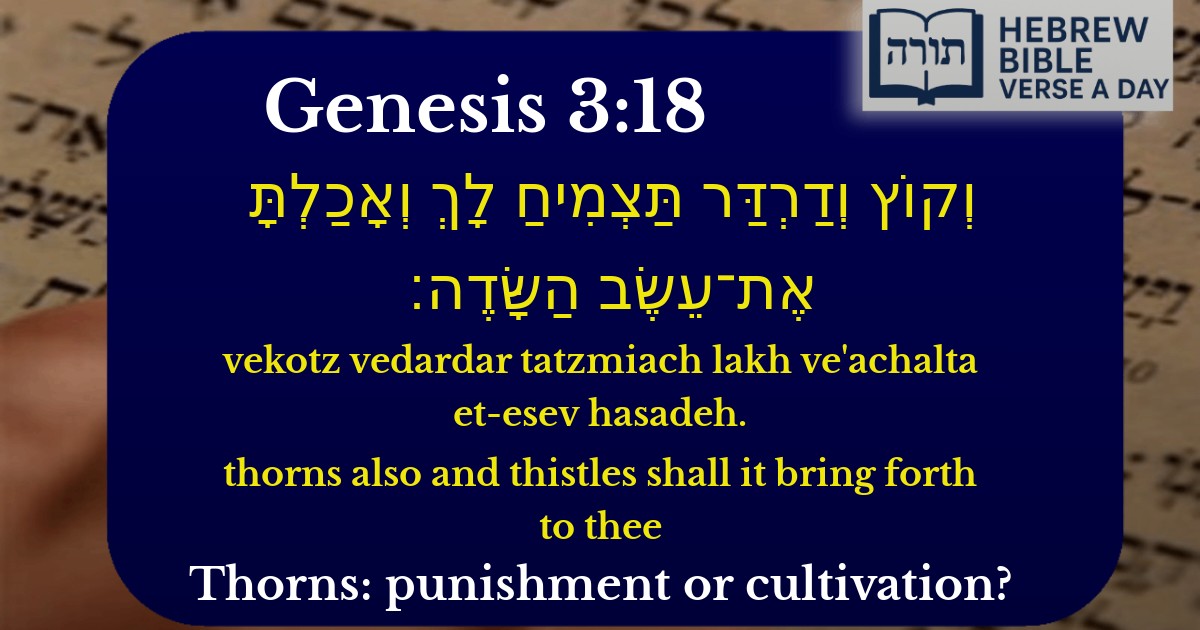Join Our Newsletter To Be Informed When New Videos Are Posted
Join the thousands of fellow Studends who rely on our videos to learn how to read the bible in Hebrew for free!
Hebrew Text
וְקוֹץ וְדַרְדַּר תַּצְמִיחַ לָךְ וְאָכַלְתָּ אֶת־עֵשֶׂב הַשָּׂדֶה׃
English Translation
thorns also and thistles shall it bring forth to thee
Transliteration
Vekotz vedardar tatzmiach lakh ve'achalta et-esev hasadeh.
Hebrew Leining Text
וְק֥וֹץ וְדַרְדַּ֖ר תַּצְמִ֣יחַֽ לָ֑ךְ וְאָכַלְתָּ֖ אֶת־עֵ֥שֶׂב הַשָּׂדֶֽה׃
וְק֥וֹץ וְדַרְדַּ֖ר תַּצְמִ֣יחַֽ לָ֑ךְ וְאָכַלְתָּ֖ אֶת־עֵ֥שֶׂב הַשָּׂדֶֽה׃
🎵 Listen to leining
Parasha Commentary
📚 Talmud Citations
This verse is quoted in the Talmud.
📖 Berakhot 40a
The verse is referenced in a discussion about the consequences of Adam's sin and the resulting difficulty in agricultural labor.
📖 Eruvin 100b
The verse is cited in a discussion about the hardships of human labor as a result of the original sin.
📖 Ketubot 111b
The verse is mentioned in the context of discussing the curses that came upon Adam and the earth.


Context in Bereishit
The verse appears in Bereishit (Genesis) 3:18 as part of the consequences given to Adam after the sin of eating from the Tree of Knowledge. The land, which previously yielded produce effortlessly, would now produce thorns and thistles, making agricultural labor difficult.
Rashi's Commentary
Rashi explains that the phrase "וְקוֹץ וְדַרְדַּר תַּצְמִיחַ לָךְ" ("thorns and thistles shall it bring forth to thee") signifies a curse upon the earth. Whereas before, the land produced beneficial crops, it will now yield unwanted growths that hinder cultivation. Rashi notes that "דַרְדַּר" (dardar) refers to a type of thorn that spreads aggressively, making it particularly troublesome for farmers.
Midrashic Interpretation
The Midrash (Bereishit Rabbah 20:10) elaborates that the earth was originally commanded to produce only desirable vegetation (as in Bereishit 1:11). However, due to Adam's sin, it now brings forth harmful plants as well. This reflects the concept of "מידה כנגד מידה" (measure for measure)—just as Adam disregarded Hashem's command, the earth would no longer fully comply with human efforts.
Rambam's Perspective
Rambam (Moreh Nevuchim 1:2) interprets this verse allegorically, suggesting that the "thorns and thistles" symbolize the obstacles and distractions that arise when human intellect is misused. The verse serves as a reminder that straying from divine wisdom leads to hardship and confusion in both physical and spiritual pursuits.
Halachic Implications
Spiritual Lesson
The verse teaches that human actions have consequences in the natural world. The presence of thorns serves as a constant reminder of the need for תשובה (repentance) and adherence to Torah. The Sforno adds that overcoming these challenges through labor refines human character, aligning with the divine plan for growth through struggle.